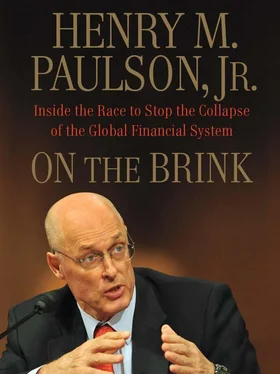As we had with Fannie Mae, we swore everyone in the room to silence. (Nonetheless the news leaked almost immediately.) When the meeting broke up, I made some more calls to the Hill and to the White House, where I gave Josh Bolten a heads-up. I spoke with, among others, New York senator Chuck Schumer; Alabama senator Richard Shelby, the ranking Republican on the Senate Banking Committee; and Alabama representative Spencer Bachus, the ranking Republican on the House Committee on Financial Services.
I went home exhausted, had a quick dinner with my wife, Wendy, and went to bed at 9:30 p.m. (I’m an “early to bed, early to rise” fellow. I simply need my eight hours of sleep. I wish it weren’t the case, but it is.)
At 10:30 p.m. the home phone rang, and I picked it up. My first thought, which I dreaded, was that maybe someone was calling to tell me Fannie was going to fight. Instead I heard the voice of Senator Barack Obama, the Democratic nominee for president.
“Hank,” he began, “you’ve got to be the only guy in the country who’s working as hard as I am.”
He was calling from someplace on the road. He had learned about the moves we’d made and wanted to talk about what it meant. I didn’t know him very well at all. At my last official function as Goldman Sachs CEO before moving to Washington, I’d invited him to speak to our partners at a meeting we’d held in Chicago. The other main speaker at that event had been Berkshire Hathaway CEO Warren Buffett.
I would, in fact, get to know Obama better over the course of the fall, speaking to him frequently, sometimes several times a day, about the crisis. I was impressed with him. He was always well informed, well briefed, and self-confident. He could talk about the issues I was dealing with in an intelligent way.
That night he wanted to hear everything we’d done and how and why. I took the senator through our thinking and our tactics. He was quick to grasp why we thought the two agencies were so critical to stabilizing the markets and keeping low-cost mortgage financing available. He appreciated our desire to protect the taxpayers as well.
“Bailouts like this are very unpopular,” he pointed out.
I replied that it wasn’t a bailout in any real sense. Common and preferred shareholders alike were being wiped out, and we had replaced the CEOs.
“That sounds like strong medicine,” Obama said. He was glad we were replacing the CEOs and asked about whether there had been any golden parachutes.
I told him we would take care of that, and he shifted the conversation to discuss the broader issues for the capital markets and the economy. He wanted to hear my views on how we’d gotten to this point, and how serious the problems were.
“It’s serious,” I said, “and it’s going to get worse.”
In all, we were on the phone that night for perhaps 30 minutes. Arizona senator John McCain’s selection of Sarah Palin as his running mate had energized the Republican base, and McCain was surging in the polls, but at least overtly there didn’t seem to be “politics” or maneuvering in Obama’s approach to me. Throughout the crisis, he played it straight. He genuinely seemed to want to do the right thing. He wanted to avoid doing anything publicly—or privately—that would damage our efforts to stabilize the markets and the economy.
But of course, there’s always politics at play: the day after the election Obama abruptly stopped talking to me.
When I woke the next morning, word of our plan to take control of Fannie and Freddie was bannered in all the major newspapers. Then, when I got to the office, I told my staff about my conversation with Obama, and they got a bit panicky. Since some Republicans considered me to be a closet Democrat, my staff had misgivings about any action on my part that might be construed as favoring Obama. So we figured I had better put in a call to McCain to even things up.
I connected with the Republican candidate late in the morning. I had a cordial relationship with John, but we were not particularly close and had never discussed economic issues—our most in-depth conversations had concerned climate change. But that day McCain was ebullient and friendly. The Palin selection had clearly revitalized him, and he began by saying he wanted to introduce me to his running mate, whom he put on the phone with us.
McCain had little more to say as I described the actions we had taken and why, but Governor Palin immediately made her presence felt. Right away she started calling me Hank. Now, everyone calls me Hank. My assistant calls me Hank. Everyone on my staff, from top to bottom, calls me Hank. It’s what I like. But for some reason, the way she said it over the phone like that, even though we’d never met, rubbed me the wrong way.
I’m also not sure she grasped the full dimensions of the situation I had sketched out—or so some of her comments made me think. But she grasped the politics pretty quickly.
“Hank,” she asked, “did any of their executives get golden parachutes? Did you fire all the people you need to? Hank, can we claw back any of their compensation?”
From that call I went into a noon meeting that lasted perhaps an hour with the board of directors of Freddie Mac. In the afternoon, around 3:00 p.m., it was Fannie Mae’s turn. To avoid publicity, we switched from FHFA headquarters to a ground-floor conference room at the Federal Housing Finance Board offices, a few blocks from Lafayette Square.
Lockhart, Bernanke, and I followed the same script from the previous afternoon: Jim led off explaining that we had decided on conservatorship, citing capital inadequacy and his list of infractions. I laid out our terms, and Ben followed with his description of the catastrophe that would occur if we did not take these actions.
Going into the weekend, there had been some trepidation among our team that the two government-sponsored enterprises (GSEs), especially Fannie, would resist. But after all my years as a Goldman Sachs banker I knew boards, and I felt sure that they would heed our call. They had fiduciary duties to their shareholders, so they would want us to make the strongest case we could. We emphasized that if the government didn’t put them into conservatorship, the companies would face insolvency and their shareholders would be worse off. I also knew that having these arguments made directly to them by their companies’ regulator, the secretary of the Treasury, and the chairman of the Federal Reserve Board would carry immense weight.
Just like the initial meetings the day before, the session with the Freddie board went much easier than the one with its sister institution. Fannie’s directors, like its management, wanted to differentiate their company from Freddie, but we made clear we could do no such thing.
I made a round of phone calls Saturday and Sunday to congressional leaders, as well as to senior financial industry executives, outlining our actions and the importance of stabilizing Fannie and Freddie. Just about everyone was supportive, even congratulatory, although I do remember Chris Dodd being a little put out when I talked to him a second time, on Sunday.
“Whatever happened to your bazooka, Hank?” he asked.
I explained that I had never thought I’d have to use the emergency powers Congress had given me in July, but given the state of affairs at the GSEs, I’d had no choice. Still, I knew I would have to spend some time with Chris to make him feel more comfortable.
After the Fannie board meeting, I received a call I’d been expecting most of the day. Word had gotten out that I’d talked to Palin, so I’d been thinking, Joe Biden’s bound to call, too. And, sure enough, he did. The predictability of it gave me my one good laugh of the day, but the Democratic vice presidential candidate was on top of the issue; he understood the nature of the problem we faced and supported our strong actions.
Читать дальше












